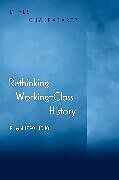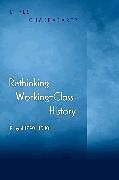Rethinking Working-Class History
Einband:
Kartonierter Einband
EAN:
9780691070308
Untertitel:
Bengal 1890-1940
Autor:
Dipesh Chakrabarty
Herausgeber:
Princeton University Press
Anzahl Seiten:
268
Erscheinungsdatum:
27.08.2000
ISBN:
069107030X
"Refreshingly original. . . . The author's clarity and consistency of purpose force one to reflect on the problematic nature of working-class history and the difficulties involved in its conceptualization and writing. . . . Chakrabarty travels consistently and illuminatingly between the warp of theoretical proposition and woof of historical specificity."
Autorentext
Dipesh Chakrabarty is Professor of South Asian Languages and Civilizations, History, and History of Culture at the University of Chicago. From 1992 through 1995, he directed the Ashworth Centre for Social Theory at the University of Melbourne. He is the author of the forthcoming Provincializing Europe.
Klappentext
Dipesh Chakrabarty combines a history of the jute-mill workers of Calcutta with a fresh look at labor history in Marxist scholarship. Opposing a reductionist view of culture and consciousness, he examines the milieu of the jute-mill workers and the way it influenced their capacity for class solidarity and "revolutionary" action from 1890 to 1940. Around and within this empirical core is built his critique of emancipatory narratives and their relationship to such Marxian categories as "capital," "proletariat," or "class consciousness." The book contributes to currently developing theories that connect Marxist historiography, post-structuralist thinking, and the traditions of hermeneutic analysis. Although Chakrabarty deploys Marxian arguments to explain the political practices of the workers he describes, he replaces universalizing Marxist explanations with a sensitive documentary method that stays close to the experience of workers and their European bosses. He finds in their relationship many elements of the landlord/tenant relationship from the rural past: the jute-mill workers of the period were preindividualist in consciousness and thus incapable of participating consistently in modern forms of politics and political organization.
Inhalt
List of Tables ix Preface xi Acknowledgments xvii Abbreviations xix 1. Intoduction 3 2. Jute: The nature of the Industry 14 3. Of Conditions and Culture 65 4. The Paradox of Organization 116 5. Protest and Authority 155 6. Class and Community 186 7. Conclusion: Rethinking Working-Class History 219 Glossary 231 Bibliography 233 Index 243

Leider konnten wir für diesen Artikel keine Preise ermitteln ...
billigbuch.ch sucht jetzt für Sie die besten Angebote ...
Die aktuellen Verkaufspreise von 6 Onlineshops werden in Realtime abgefragt.
Sie können das gewünschte Produkt anschliessend direkt beim Anbieter Ihrer Wahl bestellen.
Loading...
Die aktuellen Verkaufspreise von 6 Onlineshops werden in Realtime abgefragt.
Sie können das gewünschte Produkt anschliessend direkt beim Anbieter Ihrer Wahl bestellen.
| # | Onlineshop | Preis CHF | Versand CHF | Total CHF | ||
|---|---|---|---|---|---|---|
| 1 | Seller | 0.00 | 0.00 | 0.00 |
